Project Double Jeopardy: The Dangers of Hidden Complexity & Misplaced Certainty
Complex projects and initiatives are exposed to the twin dangers of unseen complexity and misplaced certainty. Think of it as ‘Project Double Jeopardy’ because if one does not get you, the other just might1.
The concept of double jeopardy will be familiar to fans of courtroom drama. It is a legal defence which means that a suspect, if acquitted, cannot be tried a second time for the same offence. That is interesting here too – because any defence against unseen complexity, will also protect a project against misplaced certainty.
Misplaced Certainty
If you read the statistics relating to project frustration and even failure, it is evident there is a lot of misplaced certainty going around. The much publicized reports suggest that most projects and initiatives are either over time, over budget or otherwise failing to meet expectations.
The evidence points to a systematic pattern of misplaced certainty. Those charged with making projects happen are habitually underestimating just how complex delivering successful projects actually is. Moreover, traditional project management methods strive for certainty – with budgets, timelines and results being set at the start of a project and are rigidly adhered to thereafter.
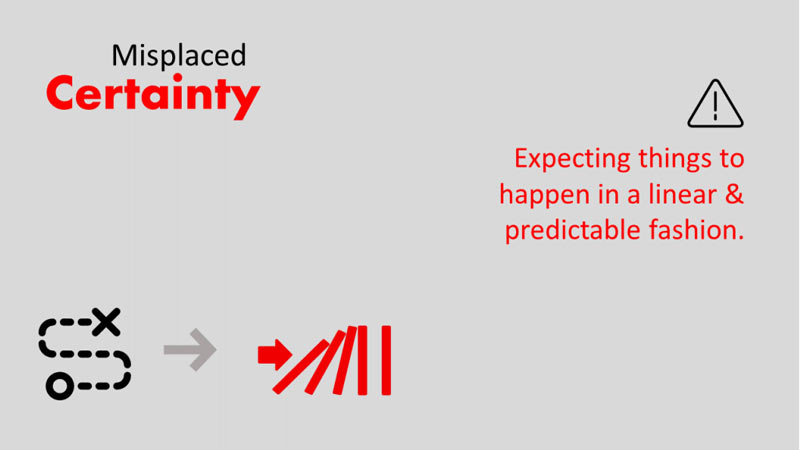
Rising Complexity
Most strategic initiatives have a high level of complexity. They have many moving parts and defy the quick fix or silver bullet. They are difficult to manage or predict and cannot be solved by traditional linear approaches.
The problem is that when initiatives are simplified that is exactly what happens – problems are handed over to one or a few experts who break them down into the component parts and work on them in isolation and applying technical solutions when more is needed.
How complex is your initiative? On a scale from 1 to 10, where 1 is ‘simple’ and 10 is ‘complex’. Where would you put your project or initiative? Gather a range of perspectives and use the table here as a checklist.
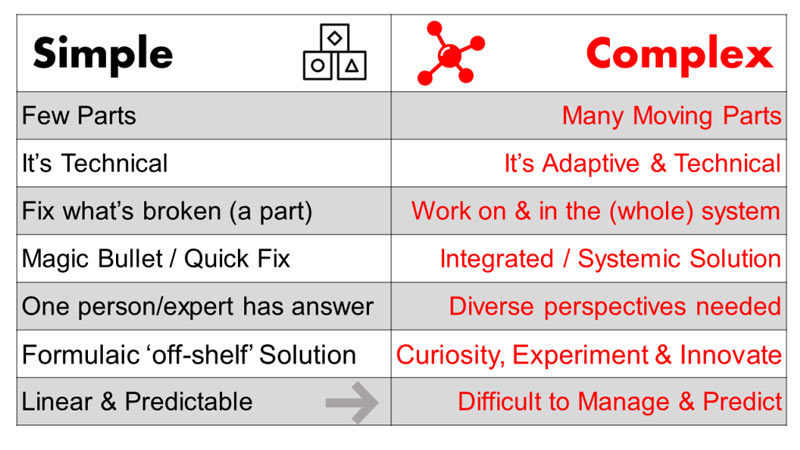
Unseen Complexity
If you have been reading business books and articles long enough you will likely remember a time when the phrase KISS (keep it simple, stupid!) was in vogue. Those were simpler times! Today’s world is a lot more complex and the challenge for leaders is to embrace complexity, rather than to keep it simple.
‘Seeing around corners’ – that is how leading business writer Rita McGrath sums up the challenges of executing strategic initiates2. It is another way of communicating complexity and uncertainty. When you cannot ‘see around the corner’ the temptation is to slow down. In times of accelerating change that is a problem – those who slow down risk being overtaken.
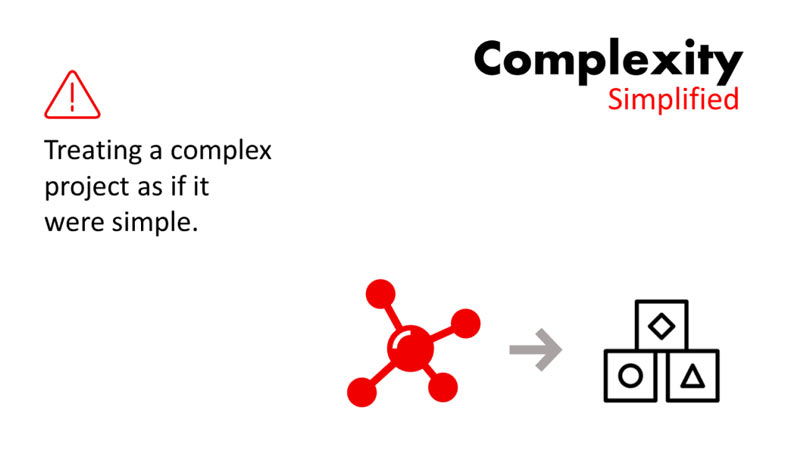
The Tendency to Simplify
Our brains are designed to simplify – that is an important part of their power and can be highly functional3. However, in complex situations, simplification is not always the best solution.
Over-simplification is a by-product of a range of cognitive heuristics and biases4. It can be seen in the temptation to:
- Look for a quick fix – underestimating the requirements of sustaining or embedding change
- Work on the parts rather than the whole
- Adopt a piecemeal rather than a systematic approach
- Work on symptoms rather than the underlying causes
- See change as purely a matter of technology or skill (i.e. technical), without appreciating the need to change mindset and behaviour (i.e. adaptive)
- Turn to experts for the solution.
Over & Under-Estimating
All the above factors are a product of our natural cognitive drive to simplify. However, the result of such unseen complexity means it is easy to overestimate what can be achieved and to underestimate what it will take (including budget and timelines). Put another way, the result is misplaced certainty regarding:
- Timelines, budgets and deliverables
- Business or stakeholder needs and market trends
- The future of an industry, business model or technology, etc.
Such misplaced certainty can result in a false sense of security and leaves a team vulnerable to shocks and surprises. The problem is not complexity, but rather unseen complexity. The danger exists when the complexity of any project or initiative is underestimated. It leaves people unprepared to deal with the opportunities and challenges that are ahead. Simplifying the complex can result in chaos.
There is a high level of uncertainty with respect to the delivery of most strategic projects and initiatives, especially those that are ‘business unusual’, rather than ‘business as unusual‘. Quite simply there may be no reference point where – a past project or experience – that you can point to and say this is how it will work and here are the results we can expect. So, estimates as regards budget, time, resource and deliverables are purely that – estimates. Just because they get put into a plan or a Gantt Chart does not make them anything more than estimates.
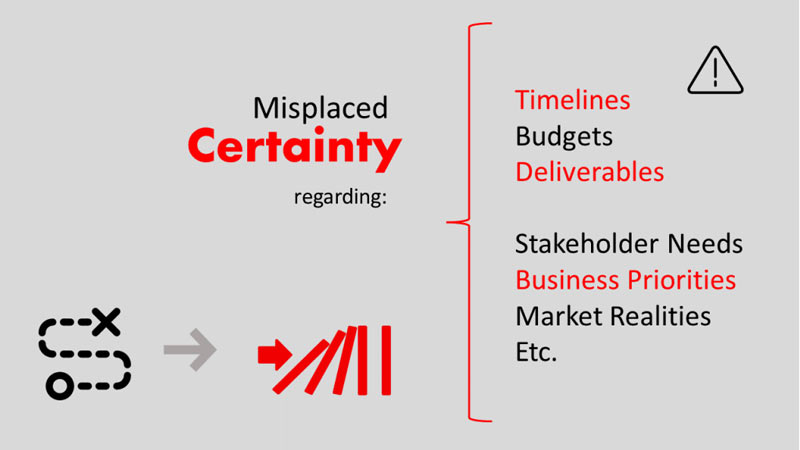
“Success requires leaders to demonstrate the courage to choose before the data is clear, the clarity to focus on the highest-potential opportunities, the curiosity to explore in the face of uncertainty, and the conviction to persevere in the face of predictable crises.”
Scott D. Anthony, Clark G. Gilbert & Mark W. Johnson5
Engaging with Complexity
Complex projects require engaging multiple actors and multiple perspectives, working on the whole rather than the parts and adaptive (requiring a change of thinking or behaviour) as well as technical solutions. They demand greater creativity and innovation, as well as curiosity and experimentation. The approach must be an agile or iterative one, where there is fast learning and continuous feedback.
When you add up the requirements for agility, innovation, teamwork and collaboration, it all amounts to new ways of working on projects and teams. That presents challenges for organizations with a top-down hierarchy and functional boundaries, where multi-year planning cycles, bureaucratic approvals committees and departmental silos constrain speed and agility, as well as collaboration and innovation.
Complex projects are typically more exciting than simple projects. The challenges they entail present opportunities for learning and growth. They present opportunities for people to fully utilize and develop their full talents and skill, to add to their resumes and build their professional network. They also reveal what organizations and teams are capable of, building levels of teamwork and collaboration.
Complicated or Complex?
There is complicated and there is complex6. That may sound like a play on words, but think of it this way: A jig saw may be complicated with many parts. However, a Rubik’s Cube is complex, not only does it have many parts but they interact with each other – if you move one then the others are affected too. That is a key factor that distinguishes complex projects – you cannot work on one part (stakeholder, risk, work stream, etc.) in isolation. Take the launch of a new Financial Services Product, marketing cannot work in isolation of IT, Compliance or Finance for example. All the parts must work well together – effective cross-functional collaboration is key.
Embracing Uncertainty
‘No doubt – no opportunity’ said the experienced senior executive. If a project leader is convinced that they have all the answers, they will likely be closed to new ideas, possibilities or outcomes. Unless there is a little crack in their confidence or certainty, where doubt can penetrate, the team is at risk of misplaced certainty.
For a team this misplaced certainty can be magnified with the power of group think coming in to place. People are likely to go with the flow rather than question the ‘wisdom of the group’. This is a key reason why projects are blind-sided by risks that could have been foreseen. Ensuring the safety of a project requires creating an environment where there is psychological safety, as well as respectful challenge, intellectual humility and sufficient variety.
Engaging with complexity means
engaging:
- Divergent Perspectives
- Assumptions
- Testable Hypotheses
- Scenarios
- Risks
- Dependencies
- Etc.
It also means trading certainty for:
- Dialog
- Curiosity
- Intellectual Humility
- Experimentation
- Agility
- Fast Learning
Silos Over-simplify
There is unseen complexity, when a project or initiative is looked at through the lens of just one function or discipline. For example, compliance sees a project through its cautious legal lens, but is likely to have only a limited appreciation of marketing’s growth lens or Finance’s numbers lens.
When the various functions combine their different lens, the result is a kaleidoscopic view of a project. It is then that the full complexity can be seen. This happens when different perspectives are combined – not just technical – but generational, cultural and so on. Making sense of this kaleidoscopic view requires effective teamwork and cross-functional collaboration.
Our data suggests that the risk of unseen complexity is greatest where an initiative represents a solo-run by one department or function. Engaging with complexity requires breaking down silos and effective cross-functional collaboration.
Caught up in the day to day busyness of a project, those involved can lose sight of the needs of the business and the realities of its market. This ‘project myopia‘ is an important cause of unseen complexity.
Source of Complexity
Our research points to the importance of distinguishing between internal and external complexity. For some organizations there is considerable complexity owing to internal factors, such as dealing with internal bureaucracy, trying to get cooperation across silos, managing internal stakeholders, juggling competing priorities, navigating internal politics and so on.
These internal factors have the potential to generate much noise and interference. Also, to generate a considerable degree of non-value added work and the frustration that accompanies it. The result is that project leaders can spend a lot of their time and energy focused internally, rather than externally. Internal complexity make responding to external complexity (e.g. new technology, business modes or channels) more difficult.
What is Knowable & When
“It is so obvious – if only I had known that some years ago!” That is a common reaction to the concept of ‘The Cone of Uncertainty‘. It shows how project estimates – time, budget, results and so on, start off disparate but get more accurate or reliable over time. The message is that you can only see so far ahead. Certainty at the outset is dangerous7.
Naturally, levels of uncertainty are high at the start (i.e. the first mile), with confidence and clarity increasing as progress is made. This is shown in the cone-shaped graph below. A high level of uncertainty is not necessarily a problem – that is unless your planning and budgeting cycle tries to deny it with misplaced certainty regarding results, timelines, etc.
The Cone of Uncertainty points to the importance of an iterative approach, including the phasing of projects and in particular the importance of a discovery / exploratory phase. It does not take away from the need to clearly set out your plan (including milestones, deliverables, etc.) at the start, but highlights the need to update regularly as you progress. This happens naturally when you adopt an agile approach with an effective plan-do-review rhythm.
Hidden Complexity and Misplaced Confidence (i.e. Project Double Jeopardy) are among of the many variables measured by Pitstop Analytics™.
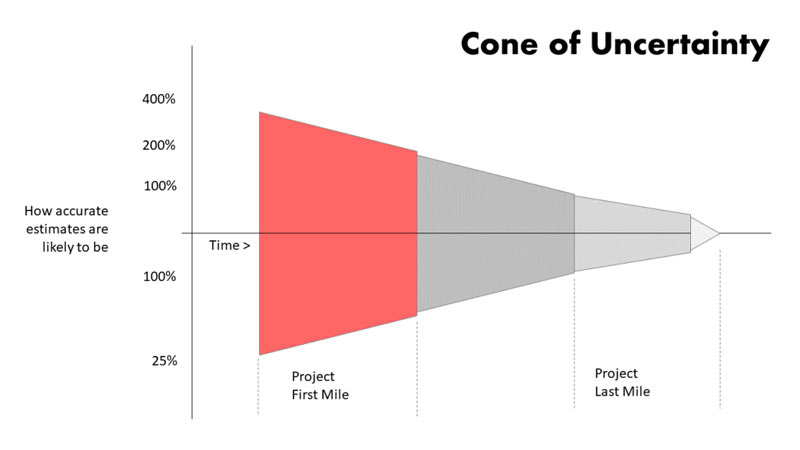
- Double Jeopardy is a legal defence to prevent a person being tried twice for the same offence, one acquitted [
]
- ((Rita McGrath & Clayton Christensen, ‘Seeing Around Corners: How to Spot Inflection Points in Business Before They Happen’, Houghton Mifflin Harcourt, 2019 [
]
- Mats Alvesson & André Spicer use the term ‘functional stupidity’ to describe both the power and the pitfalls of simplification an in particular ‘the inclination to reduce one’s scope of thinking and focus only on the narrow, technical aspects of the job.’ see ‘The Stupidity Paradox: The Power and Pitfalls of Functional Stupidity at Work’. Profile Books, 2016 [
]
- Here is what Chris Bradley, Martin Hirt & Sven Smit say about the role of bias in executive decision-making: “Strategy processes really are in the running for the world’s biggest zoo of frolicking biases and social distortions.” See: Strategy Beyond the Hockey Stick: People, Probabilities, and Big Moves to Beat the Odds, Wiley, 2018. [
]
- Scott D. Anthony, Clark G. Gilbert & Mark W. Johnson, “Dual Transformation: How to Reposition Today’s Business While Creating the Future”, HBR Press, 2017 [
]
- See The Cynefin Framework by Kurtz and Snowden in “The New Dynamics of Strategy, IBM Systems Journal 2003” [
]
- Explore the Cone of Uncertainty in its original software development context at http://www.agilenutshell.com/cone_of_uncertainty [
]
John Murphy
Email Us



